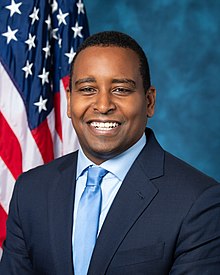Widgetized Section
Go to Admin » Appearance » Widgets » and move Gabfire Widget: Social into that MastheadOverlay zone
In wake of Mueller statement, Neguse calls for Trump impeachment inquiry

The Democratic congressmen representing Vail in Colorado’s 2nd Congressional District have a history of calling for the impeachment of President Donald Trump, and that pattern continued Wednesday with Rep. Joe Neguse saying it’s time to open an impeachment inquiry.
Neguse, speaking to Chris Hayes on MSNBC, reiterated a position he first staked out on May 21, calling for the House Judiciary Committee he serves on to begin an official impeachment inquiry in the wake of a statement from special counsel Robert Mueller on his investigation into Russian interference in the 2016 presidential election.
“I think it’s hard not to see the special counsel’s comments as anything but an impeachment referral to the Congress,” Neguse said. “I think he is making clear that he believes that the next step is one for Congress to take and obviously I believe that we ought to take that next step and open an impeachment inquiry.”
Colorado Gov. Jared Polis, who represented CD2 – including the upper Vail Valley – for a decade in Congress, voted for impeachment proceedings in December of 2017.
Neguse had been advocating for more congressional investigation and testimony following the release of the Mueller report.
“I want to read the report so I understand better precisely why [Trump] wasn’t interviewed,” Neguse said in late March. “I’d like to understand the special counsel’s rationale for not issuing a subpoena … I think it’s hard to make a judgment call without seeing the report and the findings and the underlying evidence. The American public deserves to know the truth.”
On Wednesday, Hayes asked Neguse to explain how his thinking has “evolved” on the issue of impeachment versus continued investigation – a course favored by House Speaker Nancy Pelosi.
“I think that there were a number of us that wanted to ultimately be able to review the underlying evidence, to be able to hear from the special counsel directly, to hear from some of these fact witnesses, and so were proceeding on a very methodical path in the judiciary committee,” Neguse said.
“But it became pretty clear that this administration was going to continue the pattern of obstruction that is revealed in the report by obstructing and impeding Congress at every turn in terms of preventing us from being able to get to the bottom of it, and so both the findings in the special counsel’s report, coupled with the pattern of obstruction the administration has engaged in, since led me to the conclusion that we needed to open a formal inquiry.”
Neguse also said the Mueller report makes clear that Trump engaged in impeachable offenses.
“I believed, and in reading the report it’s abundantly clear, certainly to me at least, that the president engaged in impeachable offenses, and [Republican] Rep. [Justin] Amash [of Michigan] articulated that quite well just last week,” Neguse said, referring to the first Republican to openly call for impeachment proceedings.
In his statement on Wednesday, Mueller, who is stepping down as special counsel, stated quite clearly that if he could have cleared Trump of criminal wrongdoing he would have, and that – contrary to statements from Trump and Attorney General William Barr that the report found no evidence of collusion or obstruction – there simply was “insufficient evidence” of a broader conspiracy between the Trump campaign and Russians seeking to help elect Trump president. Some analysts believe Trump’s obstruction may have blocked access to sufficient evidence.
“The report has two parts, addressing the two main issues we were asked to investigate,” Mueller said Wednesday. “The first volume of the report details numerous efforts emanating from Russia to influence the election. This volume includes a discussion of the Trump campaign’s response to this activity, as well as our conclusion that there was insufficient evidence to charge a broader conspiracy. And in the second volume, the report describes the results and analysis of our obstruction of justice investigation involving the president.
“The order appointing me special counsel authorized us to investigate actions that could obstruct the investigation. We conducted that investigation, and we kept the office of the acting attorney general apprised of the progress of our work. And as set forth in the report, after that investigation, if we had had confidence that the president clearly did not commit a crime, we would have said so. We did not, however, make a determination as to whether the president did commit a crime.”
Mueller also made it clear that Justice Department policy allows for the investigation but not the indictment of a sitting president and that ultimately it’s up to Congress to decide if Trump committed crimes and therefore should be removed from office.
“First, the [Justice Department] opinion explicitly permits the investigation of a sitting president, because it is important to preserve evidence while memories are fresh and documents available. Among other things, that evidence could be used if there were co-conspirators who could be charged now,” Mueller said.
“And second, the opinion says that the Constitution requires a process other than the criminal justice system to formally accuse a sitting president of wrongdoing. And beyond department policy, we were guided by principles of fairness. It would be unfair to potentially — it would be unfair to potentially accuse somebody of a crime when there can be no court resolution of the actual charge.”


